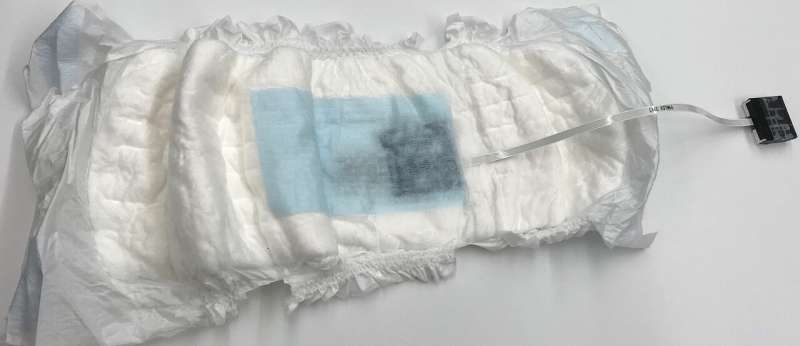How diaper sensors can better detect urinary tract infections, reduce more severe diseases

A urinary tract infection can be painful at any age, with the burning sensations, frequent urges and pressure. It can be even worse and more dangerous for those who may not be able to communicate clearly what is happening to their bodies, such as the elderly and babies.
Urinary tract infections are responsible for nearly 10 million doctor visits each year in the United States. They can also be a major source of additional disease, particularly for elderly people.
Many current technologies to try to detect UTIs can be difficult to use and require a urine sample be processed, which can be inconvenient and slow in receiving results.
Purdue University researchers have come up with a way to embed a disposable sensor device in diapers to better detect UTIs. The device has been tested and proven to accurately detect UTIs.
"Our technology can help detect UTIs in babies and the elderly who already wear diapers in daily living," said Babak Ziaie, a professor of computer and electrical engineering in Purdue's College of Engineering. "These people are often not able to communicate their symptoms or they do not show typical symptoms for UTIs."
Urinary tract infections develop when bacteria get into the urinary tract and multiply, leading to redness and pain in the urinary tract. Some typical symptoms include an urgent need to urinate, a burning feeling when using the bathroom and a strong odor to the urine. The infection can easily spread to the kidneys and become more severe.
The Purdue researchers created a diaper-embedded transponder that, once activated by urine, measures and transmits the information via a wireless link to the caregiver. The sensor checks for nitrites, which are chemical compounds commonly associated with such infections.
"The transponder is autonomous, self-powered and provides accurate and timely information," said Ziaie, who worked with Byunghoo Jung, a professor of computer and electrical engineering at Purdue. "It can easily be placed in a diaper and detect the presence of an infection."
Doctors typically check for a urinary tract infection by testing a urine sample for bacteria and blood cells. A culture of the urine tells the doctor which bacteria are present.
"We have at least two big advantages here with our device," Ziaie said. "It is autonomous, it does not require obtaining urine samples by the patient or their caregivers, and can help detect an infection in people who might not yet show symptoms."













